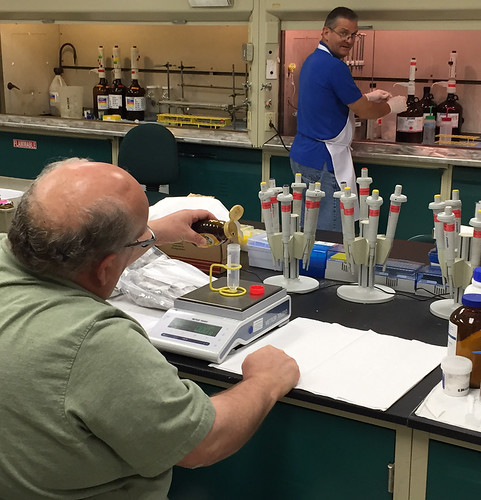
This post is part of the Science Tuesday feature series on the USDA blog. Check back each week as we showcase stories and news from USDA’s rich science and research portfolio.
The buzz of a honey bee and the flutter of a butterfly bring happy thoughts of beautiful gardens. These pollinators are also hard at work providing vital services that are critical to our national and global food supplies. Honey bees to native bees and birds, bats and butterflies help ensure the production of plentiful fruits, nuts, and vegetables. Pollination by honey bees alone adds more than $15 billion in value to agricultural crops each year. Unfortunately, the number of pollinators has been declining in recent years due to many factors.
It is possible that pesticide residue exposure may play an indirect role in pollinator decline, which is why analyzing residue continues to be an important part of the puzzle. Honey bee research is focused on gathering data from a variety of sources to better understand overall honey bee health. USDA’s Agricultural Marketing Service (AMS) provides pollinator product sample testing for more than 60 stakeholders through our National Science Laboratories, part of our Science and Technology Program.
As part of the long-term efforts to study the honey bee decline, AMS scientists perform analysis on a broad range of pesticide residues in honey bee products—including pollen, beeswax, honey, nectar, royal jelly and the bees themselves. Since 2006, the National Science Laboratories have provided testing services to honey bee stakeholders - from federal and state agencies to academic institutions, industry corporations and beekeepers themselves - with a reputation for quality pesticide residue analysis.
Having tested pesticide residues in over 10,000 samples, our work is helping researchers and beekeepers better understand the effects of pesticide residue exposure on honey bees. We use state of the art equipment for analysis, with detection limits at or near 1 part per billion. That’s the equivalent to one drop of water diluted into 11,008 gallons. The National Science Laboratories are located in Gastonia, N.C., and testing is offered on a fee for service basis.
We offer chemical, microbiological, and bio-molecular testing services for a wide variety of agricultural products. This includes bee keepers wanting to test hive products for pesticide residues. AMS is proud to offer services that support research into pollinator health issues. We are committed to working with our honey bee stakeholders to solve the honey bee decline puzzle and help the industry continue to benefit from these valuable pollinators.

